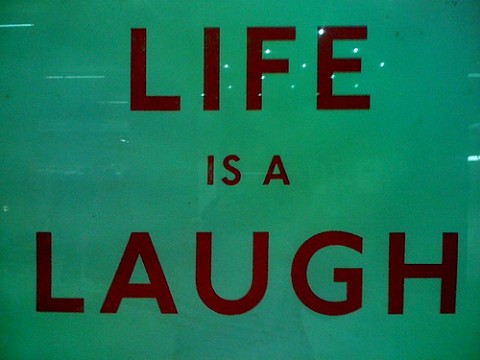Humor for Our Humanity
April 1, 2010 Leave a comment
|Photo by futureshape|http://www.flickr.com/photos/futureshape/2037704163|
(In the spirit of April Fool’s)
A town is hit by a fire that catches in the church district one evening. As the fire spreads, so does word among the members of the neighboring congregations. Before long, people have assembled in front of their respective houses of worship and are deciding what to rescue from inside. A roving reporter goes from group to group to see how they’re responding. She notes that the Catholics have already salvaged the communion cup. Moving to the Episcopal Church, she witnesses a man emerging from smoke to cheers as he hoists the Book of Common Prayer. The reporter heads next to the Unitarians, and as she approaches cannot see a particular object among the group assembled in the street. Observing the expressions on peoples’ faces, she becomes alarmed that someone may still be inside the church, which is on the verge of collapsing. As she gets closer she hears the group in heated debate about who should be on the ad hoc committee to make the final decision about what to rescue . . .
Beyond being a good-natured jab at my fellow Unitarians, this joke could also be a light-hearted commentary on collaboration. I once told it to a group of Unitarians attending a workshop I co-facilitated. At a break I was approached by a woman who said that she disapproved. “We do ourselves a disservice to make fun of ourselves that way,” she said. I respectfully disagreed. I believe we do ourselves a disservice if we take ourselves too seriously, whether we are people of faith or people engaged in the often messy work of collaboration. Humor can be a Godsend when it comes to complex multi-stakeholder work. Carie Fox and David Ceppos, from the Center for Collaborative Policy, write that in collaborative problem-solving, humor can be a vital tool in “helping [people] make the pie bigger rather than fighting over who gets what slice.” It can develop bonds, teach valuable lessons, and remind us of our shared humanity.
Of course there are risks. Timing is everything. Knowing what not to say and when not to say it is important. Personally, I’ve often found it effective to be self-deprecating as a facilitator. Taking this route can be a “noble risk,” as Fox and Ceppos put it, for the sake of the group. It can be a bold first move that indicates to people that we feel comfortable with them, and that while the work may be difficult, we also want to have fun. Furthermore, as comedian A. Whitney Brown once said, “This is the saving grace of humor, if you fail no one is laughing at you.”
So let’s hear those collaboration jokes!
No Comments
So how about this one? How many collaboration consultants agents does it take to change a light bulb? At least five . . . one to scope the job, one to pull together and charter a process design team, one to facilitate the design of the process (making sure to include the lightbulb as a stakeholder), one to record content from the meetings, and one to facilitate an emergent experience during which the lightbulb ultimately changes itself (i.e. self-organizes).